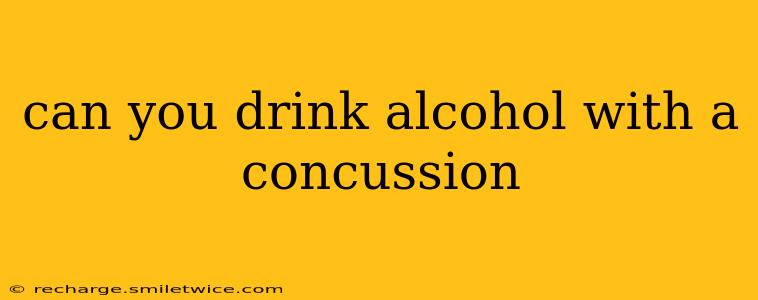Can You Drink Alcohol With a Concussion? The Definitive Answer
A concussion, a type of traumatic brain injury (TBI), is a serious medical condition requiring careful management. One crucial aspect of recovery is avoiding alcohol. The short answer is a resounding no, you should absolutely not drink alcohol with a concussion. Here's why:
Why Alcohol and Concussions Don't Mix
Alcohol is a depressant, meaning it slows down brain activity. After a concussion, your brain is already vulnerable and working hard to heal. Consuming alcohol can exacerbate this vulnerability in several ways:
-
Increased Inflammation: Alcohol can increase inflammation in the brain, hindering the healing process. This inflammation can prolong recovery time and potentially worsen symptoms.
-
Impaired Healing: Your brain needs time and rest to repair itself after a concussion. Alcohol interferes with this process, potentially delaying recovery and increasing the risk of long-term complications.
-
Exacerbated Symptoms: Alcohol can worsen common concussion symptoms such as headaches, dizziness, nausea, and cognitive difficulties. This can lead to a more prolonged and uncomfortable recovery.
-
Increased Risk of Bleeding: In some cases, a concussion can involve internal bleeding in the brain. Alcohol can thin the blood, increasing the risk of further bleeding and potentially leading to serious complications.
-
Medication Interactions: If you're taking prescribed medication for your concussion, alcohol can interact negatively with these drugs, leading to unpredictable and potentially dangerous side effects.
What Happens If You Drink Alcohol After a Concussion?
The effects of consuming alcohol after a concussion can vary depending on factors like the severity of the concussion, the amount of alcohol consumed, and individual sensitivities. However, potential consequences include:
- Prolonged recovery: Your recovery time could be significantly extended.
- Worsening of symptoms: Existing symptoms could become more severe and persistent.
- Increased risk of complications: The risk of developing long-term complications such as post-concussion syndrome (PCS) could increase.
- Emergency situations: In severe cases, alcohol consumption after a concussion could trigger a medical emergency.
How Long Should You Avoid Alcohol After a Concussion?
There's no single definitive timeframe for avoiding alcohol after a concussion. It's crucial to consult your doctor or healthcare provider. They can assess your specific situation and recommend the appropriate abstinence period based on the severity of your injury and your individual recovery progress. Complete healing often takes several weeks or even months. Drinking during this crucial period can severely hinder your recovery.
What About Other Drugs and Substances?
Just like alcohol, other drugs and substances can interfere with concussion recovery. It is essential to avoid all recreational drugs and substances during your recovery period. Discuss any medications, supplements, or over-the-counter drugs with your doctor before taking them.
Can I Drink Alcohol After a Mild Concussion?
Even a mild concussion warrants caution regarding alcohol consumption. The brain is still injured, and alcohol can still hinder the healing process. Always consult your doctor.
What are the symptoms of a concussion?
Symptoms of a concussion can vary widely in severity and presentation, and they may not always be immediately apparent. Common symptoms include headache, dizziness, nausea, vomiting, confusion, memory problems, sensitivity to light and noise, balance problems, and difficulty concentrating. If you suspect you have a concussion, seek medical attention immediately.
Remember, your health is paramount. Avoiding alcohol and following your doctor's recommendations are crucial steps toward a safe and effective concussion recovery. Always prioritize your well-being and seek professional medical advice.
